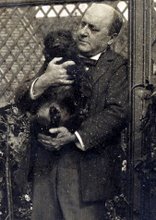Tuesday, August 21, 2007
Whig History
The link above will take you to Mark Lilla's article in this past Sunday's New York Times Magazine, "The Great Separation," in which he reminds us that Whigs invented the separation of theology and politics. Their hired propagandist Thomas Hobbes had the idea that monarchies were not divinely established, but were a purely human arrangement. After five hundred years of brutal state warfare in Europe and America, the idea took hold and "we" seem to have settled for liberal democracy. A little broad brush, but what the hell; Lilla's article this morning is the third most blogged item in the Times. I am glad to welcome him to the modern Whigs, and especially note his warning that not every nation necessarily follows this course. He is warning us, perhaps unnecessarily, about Muslim nations. He doesn't mention, as he might, the perpetually smiling bully who occupies the office of president and who seems to think he was anointed by God to make war on the infidels.
Thursday, August 2, 2007
Boss Tweed
The presidential system has turned out badly, for a couple of reasons. Two recent books by Kenneth D. Ackerman (both are entertaining in lots of ways) illustrate them. In "Dark Horse," he talked about party politics in the amazingly corrupt era after the Civil War, when Republicans controlled all three branches of the federal government, and fell to fighting over the spoils. In his latest, "Boss Tweed," he talks about Tweed's audacious effort to seize control first of the Democratic Party in New York City, and then to extend his control first to the state and then to the national government. He was thwarted by a venomous rival, Samuel Tilden, who used the governor's powers to bring down Tammany Hall. Ackerman makes it a curiously modern story of political power, media power, and the use of criminal prosecutions for political ends. Some lessons drawn in the final chapter have a familiar ring: "It's hard not to admire the skill behind Tweed's system. . . . The Tweed Ring at its height was an engineering marvel, strong and solid, strategically placed to control key power points: the courts, the legislature, the treasury, and the ballot box." The system was financed by contracts awarded to the friends of Tammany Hall, and the contracts were financed by borrowing. "Tweed's system had an irresistible logic . . . Taxes stayed low; [the Ring] financed city operations mostly with debt, selling bonds [abroad] . . . pushing off payment until another day. For the wealthy, Tweed produced dynamism and growth." His regime produced a surge of civic pride, a kind local nationalism. Unfortunately, the pyramid of debt eventually collapsed, as it was bound to do. Moral of the story, perhaps: Party rule leads to problems, whatever the party.
Wednesday, August 1, 2007
Speaking of Princes. . . .
The tenth anniversary of Diana's death has been marked by innumerable television, magazine and book releases, not many of which I have seen. I did watch with great pleasure the film "The Queen," starring the admirable Helen Mirren as the Queen, which cast Tony Blair as a Whig anxious to preserve the ceremonial monarchy. (The Queen came off as a Tory, divine-right-of-monarchy sort, which I imagine was fair enough). The most interesting of the items I have seen is Jeremy Paxman's book "On Royalty," an extended, smart and very funny investigation of modern, constitutional monarchies. He is puzzled to know why anyone would want to be a powerless monarch, living in a bell jar, or why so many people in otherwise democratic countries cling to their monarchs. Lots of food for thought, including this passage from the preface, reflecting on the popularity of Elizabeth and Diana in the US: "America has defined itself in part by the way it filled the vacuum created by throwing off the monarchial yoke. The monarch, in absentia, is as crucial to the identity of America as she is, in person, to the idea of Britain. Perhaps that is why she remains such a figure of fascination." Hum.
Prince Barack
I would like to recruit Barack Obama to the Whig party; as candidate for Prince of the North, rather than president. A great many people seem to share my sense that he literally embodies America's diverse history and idealism, European, African and Asian. He has devoted himself to public service and is just the face we would like to hold out to the world -- like Princess Diana and President John F. Kennedy -- an aristocratic and attractive champion of the disadvantaged. The difficulty with our constitutional system is that the president has to be an able commander-in-chief and chief magistrate, as well as the embodiment of the nation. The Whig project is to separate the two functions, and who better to represent that program than the ideal royal, Barack Obama. You will object that he is too intelligent to be a royal, which is a point well taken. But perhaps we can begin a new tradition. . . .
Subscribe to:
Comments (Atom)


